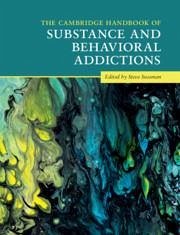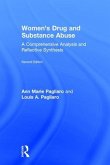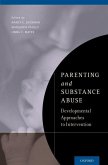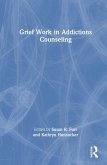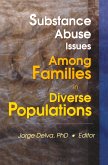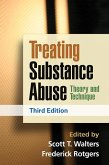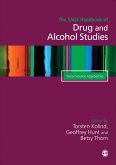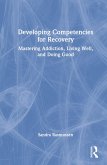The Cambridge Handbook of Substance and Behavioral Addictions
Herausgeber: Sussman, Steve
The Cambridge Handbook of Substance and Behavioral Addictions
Herausgeber: Sussman, Steve
- Gebundenes Buch
Andere Kunden interessierten sich auch für
![Women's Drug and Substance Abuse Women's Drug and Substance Abuse]() Ann Marie PagliaroWomen's Drug and Substance Abuse186,99 €
Ann Marie PagliaroWomen's Drug and Substance Abuse186,99 €![Parenting and Substance Abuse Parenting and Substance Abuse]() Parenting and Substance Abuse228,99 €
Parenting and Substance Abuse228,99 €![Grief Work in Addictions Counseling Grief Work in Addictions Counseling]() Grief Work in Addictions Counseling186,99 €
Grief Work in Addictions Counseling186,99 €![Substance Abuse Issues Among Families in Diverse Populations Substance Abuse Issues Among Families in Diverse Populations]() Jorge DelvaSubstance Abuse Issues Among Families in Diverse Populations153,99 €
Jorge DelvaSubstance Abuse Issues Among Families in Diverse Populations153,99 €![Treating Substance Abuse Treating Substance Abuse]() Treating Substance Abuse100,99 €
Treating Substance Abuse100,99 €![The Sage Handbook of Drug & Alcohol Studies The Sage Handbook of Drug & Alcohol Studies]() The Sage Handbook of Drug & Alcohol Studies468,99 €
The Sage Handbook of Drug & Alcohol Studies468,99 €![Developing Competencies for Recovery Developing Competencies for Recovery]() Sandra RasmussenDeveloping Competencies for Recovery172,99 €
Sandra RasmussenDeveloping Competencies for Recovery172,99 €-
-
-
Produktdetails
- Verlag: Cambridge University Press
- Seitenzahl: 464
- Erscheinungstermin: 10. September 2020
- Englisch
- Abmessung: 282mm x 216mm x 25mm
- Gewicht: 1406g
- ISBN-13: 9781108427166
- ISBN-10: 1108427162
- Artikelnr.: 60896643
Hinweis: Dieser Artikel kann nur an eine deutsche Lieferadresse ausgeliefert werden.
- Herstellerkennzeichnung
- Libri GmbH
- Europaallee 1
- 36244 Bad Hersfeld
- gpsr@libri.de
List of figures
List of tables
List of contributors
Foreword
Preface
Acknowledgements
Part I. Concepts of Addiction: 1. Appetitive needs and addiction
2. Behavioral economics and addictive disorders
3. Sensitization of incentive salience and the transition to addiction
4. Philosophical issues in the addictions
Part II. Clinical and research methods in the addictions: 5. Human neurobiological approaches to hedonically motivated behaviors
6. Human laboratory paradigms in addictions research
7. Behavioral economic considerations of novel addictions and non-addictive behavior: research and analytic methods
8. Substance and behavioral addictions assessment instruments
9. Qualitative approaches to the study of substance and behavioral addictions
Part III. Levels of analysis and etiology: 10. Neurobiology of substance addictions
11. Neurobiological foundations of behavioral addictions
12. Multiple memory systems, addiction, and health habits: new routes for translational science
13. The role of culture in addiction
14. The physical and social environments as determinants of health: implications for substance and behavioral addictions
Part IV. Prevention and treatment: 15. Adolescent drug misuse prevention: challenges in school-based programming
16. Treatment of alcohol, tobacco, and other drug (ATOD) misuse
17. Prevention and treatment of 'food addiction'
18. The prevention and treatment of gambling disorders: some art, some science
19. Prevention and treatment of sex addiction
20. Passionate love addiction: an evolutionary survival mechanism that can go terribly wrong
21. Prevention and treatment of compulsive buying disorder
22. Prevention and treatment of work addiction
23. Gaming disorder and its treatment
Part V. Ongoing and future research directions: 24. Precision behavioral management (PBM): a novel genetically guided therapy to combat reward deficiency syndrome (RDS) relevant to the opiate crisis
25. Novel psychoactive substances: a new challenge for prevention and treatment
26. Impaired physicians
27. Feedback models for gambling control: the use and efficacy of online responsible gambling tools
28. Food versus eating addictions
29. Measurement, prevention and treatment of exercise addiction
30. Tanning as an addiction: the state of the research and implications for intervention
31. Considering the overlap and non-overlap of compulsivity, impulsivity, and addiction
32. Anhedonia in addictive behaviors
33. Mindfulness-based interventions applied to addiction treatments
34. American legal issues in addiction treatment and research
Index.
List of tables
List of contributors
Foreword
Preface
Acknowledgements
Part I. Concepts of Addiction: 1. Appetitive needs and addiction
2. Behavioral economics and addictive disorders
3. Sensitization of incentive salience and the transition to addiction
4. Philosophical issues in the addictions
Part II. Clinical and research methods in the addictions: 5. Human neurobiological approaches to hedonically motivated behaviors
6. Human laboratory paradigms in addictions research
7. Behavioral economic considerations of novel addictions and non-addictive behavior: research and analytic methods
8. Substance and behavioral addictions assessment instruments
9. Qualitative approaches to the study of substance and behavioral addictions
Part III. Levels of analysis and etiology: 10. Neurobiology of substance addictions
11. Neurobiological foundations of behavioral addictions
12. Multiple memory systems, addiction, and health habits: new routes for translational science
13. The role of culture in addiction
14. The physical and social environments as determinants of health: implications for substance and behavioral addictions
Part IV. Prevention and treatment: 15. Adolescent drug misuse prevention: challenges in school-based programming
16. Treatment of alcohol, tobacco, and other drug (ATOD) misuse
17. Prevention and treatment of 'food addiction'
18. The prevention and treatment of gambling disorders: some art, some science
19. Prevention and treatment of sex addiction
20. Passionate love addiction: an evolutionary survival mechanism that can go terribly wrong
21. Prevention and treatment of compulsive buying disorder
22. Prevention and treatment of work addiction
23. Gaming disorder and its treatment
Part V. Ongoing and future research directions: 24. Precision behavioral management (PBM): a novel genetically guided therapy to combat reward deficiency syndrome (RDS) relevant to the opiate crisis
25. Novel psychoactive substances: a new challenge for prevention and treatment
26. Impaired physicians
27. Feedback models for gambling control: the use and efficacy of online responsible gambling tools
28. Food versus eating addictions
29. Measurement, prevention and treatment of exercise addiction
30. Tanning as an addiction: the state of the research and implications for intervention
31. Considering the overlap and non-overlap of compulsivity, impulsivity, and addiction
32. Anhedonia in addictive behaviors
33. Mindfulness-based interventions applied to addiction treatments
34. American legal issues in addiction treatment and research
Index.
List of figures
List of tables
List of contributors
Foreword
Preface
Acknowledgements
Part I. Concepts of Addiction: 1. Appetitive needs and addiction
2. Behavioral economics and addictive disorders
3. Sensitization of incentive salience and the transition to addiction
4. Philosophical issues in the addictions
Part II. Clinical and research methods in the addictions: 5. Human neurobiological approaches to hedonically motivated behaviors
6. Human laboratory paradigms in addictions research
7. Behavioral economic considerations of novel addictions and non-addictive behavior: research and analytic methods
8. Substance and behavioral addictions assessment instruments
9. Qualitative approaches to the study of substance and behavioral addictions
Part III. Levels of analysis and etiology: 10. Neurobiology of substance addictions
11. Neurobiological foundations of behavioral addictions
12. Multiple memory systems, addiction, and health habits: new routes for translational science
13. The role of culture in addiction
14. The physical and social environments as determinants of health: implications for substance and behavioral addictions
Part IV. Prevention and treatment: 15. Adolescent drug misuse prevention: challenges in school-based programming
16. Treatment of alcohol, tobacco, and other drug (ATOD) misuse
17. Prevention and treatment of 'food addiction'
18. The prevention and treatment of gambling disorders: some art, some science
19. Prevention and treatment of sex addiction
20. Passionate love addiction: an evolutionary survival mechanism that can go terribly wrong
21. Prevention and treatment of compulsive buying disorder
22. Prevention and treatment of work addiction
23. Gaming disorder and its treatment
Part V. Ongoing and future research directions: 24. Precision behavioral management (PBM): a novel genetically guided therapy to combat reward deficiency syndrome (RDS) relevant to the opiate crisis
25. Novel psychoactive substances: a new challenge for prevention and treatment
26. Impaired physicians
27. Feedback models for gambling control: the use and efficacy of online responsible gambling tools
28. Food versus eating addictions
29. Measurement, prevention and treatment of exercise addiction
30. Tanning as an addiction: the state of the research and implications for intervention
31. Considering the overlap and non-overlap of compulsivity, impulsivity, and addiction
32. Anhedonia in addictive behaviors
33. Mindfulness-based interventions applied to addiction treatments
34. American legal issues in addiction treatment and research
Index.
List of tables
List of contributors
Foreword
Preface
Acknowledgements
Part I. Concepts of Addiction: 1. Appetitive needs and addiction
2. Behavioral economics and addictive disorders
3. Sensitization of incentive salience and the transition to addiction
4. Philosophical issues in the addictions
Part II. Clinical and research methods in the addictions: 5. Human neurobiological approaches to hedonically motivated behaviors
6. Human laboratory paradigms in addictions research
7. Behavioral economic considerations of novel addictions and non-addictive behavior: research and analytic methods
8. Substance and behavioral addictions assessment instruments
9. Qualitative approaches to the study of substance and behavioral addictions
Part III. Levels of analysis and etiology: 10. Neurobiology of substance addictions
11. Neurobiological foundations of behavioral addictions
12. Multiple memory systems, addiction, and health habits: new routes for translational science
13. The role of culture in addiction
14. The physical and social environments as determinants of health: implications for substance and behavioral addictions
Part IV. Prevention and treatment: 15. Adolescent drug misuse prevention: challenges in school-based programming
16. Treatment of alcohol, tobacco, and other drug (ATOD) misuse
17. Prevention and treatment of 'food addiction'
18. The prevention and treatment of gambling disorders: some art, some science
19. Prevention and treatment of sex addiction
20. Passionate love addiction: an evolutionary survival mechanism that can go terribly wrong
21. Prevention and treatment of compulsive buying disorder
22. Prevention and treatment of work addiction
23. Gaming disorder and its treatment
Part V. Ongoing and future research directions: 24. Precision behavioral management (PBM): a novel genetically guided therapy to combat reward deficiency syndrome (RDS) relevant to the opiate crisis
25. Novel psychoactive substances: a new challenge for prevention and treatment
26. Impaired physicians
27. Feedback models for gambling control: the use and efficacy of online responsible gambling tools
28. Food versus eating addictions
29. Measurement, prevention and treatment of exercise addiction
30. Tanning as an addiction: the state of the research and implications for intervention
31. Considering the overlap and non-overlap of compulsivity, impulsivity, and addiction
32. Anhedonia in addictive behaviors
33. Mindfulness-based interventions applied to addiction treatments
34. American legal issues in addiction treatment and research
Index.

